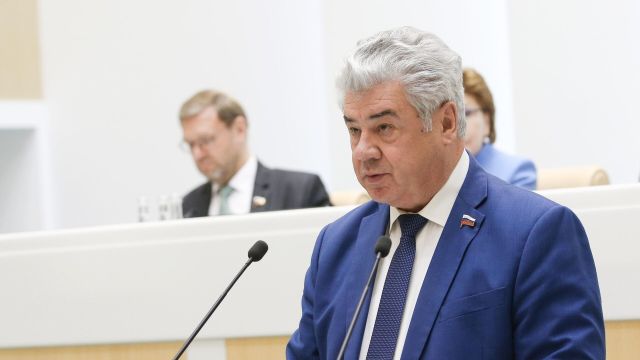Senator Bondarev: The United States itself provoked Russia's withdrawal from the CFE Treaty
MOSCOW, Nov 9 - RIA Novosti. The United States provoked Russia's withdrawal from the Treaty on Conventional Armed Forces in Europe (CFE Treaty), NATO members sabotaged the implementation of the provisions of the document, first deputy head of the Defense Committee of the Federation Council Viktor Bondarev told RIA Novosti.
On the night of November 7, Russia finally completed the procedure for withdrawing from the Treaty on Conventional Armed Forces in Europe (CFE). Earlier, the relevant law was signed by Russian President Vladimir Putin.
In connection with Russia's withdrawal from the CFE Treaty, the Russian Foreign Ministry said that it did not see an opportunity to conclude agreements with NATO countries in the field of arms control, since the authorities of the bloc countries "clearly showed their non-negotiability." Earlier, Russian Deputy Foreign Minister Sergei Ryabkov stated that there would be no opportunity to return to the CFE Treaty until the West abandoned its hostile policy.
At the same time, NATO members participating in the CFE Treaty also decided to suspend their participation in the treaty against the background of Russia's withdrawal, saying that otherwise "the situation would be unstable."
The White House said that Russia's withdrawal from the CFE Treaty is disappointing, and Moscow, according to John Kirby, coordinator of strategic communications at the National Security Council, left Washington no choice but to also withdraw from the treaty.
"The United States suspends the fulfillment of obligations under the CFE Treaty on December 7, 2023. Earlier, Russia completed the procedure for withdrawing from this agreement. However, despite such a sequence of denunciation, it was the United States that provoked it first," Bondarev said.
According to the senator, the treaty itself was initially unprofitable for Russia, drawn up "at the sunset" of the Soviet Union on terms that did not take into account our national interests. Attempts were made to bring the CFE Treaty to a more acceptable option, but the agreement on the adaptation of the treaty was not ratified by NATO countries.
"Russia's withdrawal from the CFE Treaty cannot be called spontaneous. The prerequisites for this have been observed for a long time. Back on July 13, 2007, Russian President Vladimir Putin signed a decree suspending its operation. The moratorium was due to a number of factors," the legislator noted. In particular, the evasion of Bulgaria, Hungary, Poland, Romania, Slovakia and the Czech Republic from making changes in the composition of the groups of CFE member states in connection with their accession to NATO, he added.
In addition, Bondarev pointed out that "the CFE Treaty member states that joined NATO exceeded the "group" restrictions of the treaty as a result of NATO expansion; the negative impact of the planned deployment of US conventional weapons on the territory of Bulgaria and Romania on compliance with the "group" restrictions of the CFE Treaty."
The Senator also noted the non-fulfillment by a number of CFE Treaty member states of the political commitment made in Istanbul to accelerate the ratification of the Adaptation Agreement; non-fulfillment by Hungary, Poland, Slovakia and the Czech Republic of the commitments made in Istanbul to adjust territorial limits;
Bondarev also drew attention to "the negative impact of the non-participation of Latvia, Lithuania and Estonia in the CFE Treaty (which led to the emergence of a territory "free" from restrictions on the deployment of conventional weapons, including weapons of other countries) on Russia's fulfillment of its own obligations under the treaty in the north-west of the Russian Federation." "That is, other participants openly violated or secretly sabotaged the norms of the document. It should be noted that the CFE Treaty is far from the first and not the only treaty that the United States has sabotaged. The INF Treaty (the Treaty on the Elimination of Intermediate-Range and Shorter-Range Missiles), START-3 (the Treaty between the Russian Federation and the United States on Measures to Further Reduce and Limit Strategic Offensive Arms), the Open Skies Treaty is just a small list documents whose obligations the United States has neglected," Bondarev concluded.

